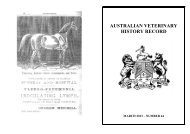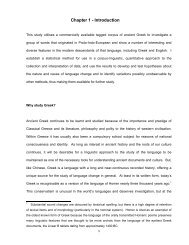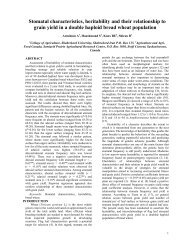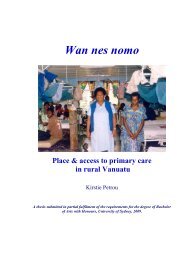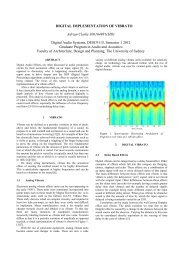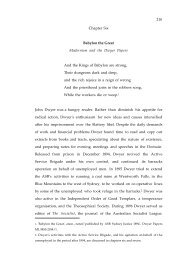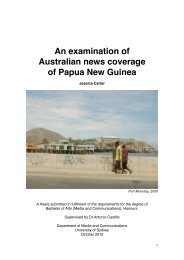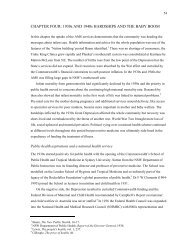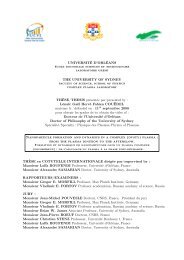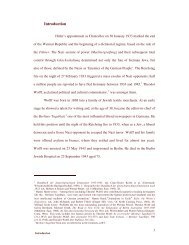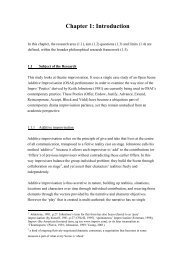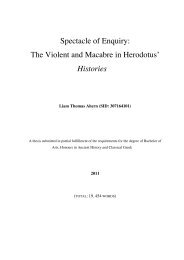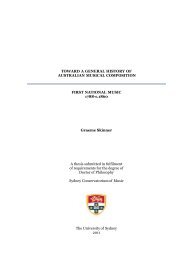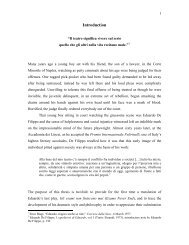journal of digital research & publishing - The Sydney eScholarship ...
journal of digital research & publishing - The Sydney eScholarship ...
journal of digital research & publishing - The Sydney eScholarship ...
Create successful ePaper yourself
Turn your PDF publications into a flip-book with our unique Google optimized e-Paper software.
1 P M J O U R N A L O F D I G I T A L R ESEARCH & P UBLISHING<br />
to <strong>of</strong>fer an explanation through the examination <strong>of</strong>:<br />
Google China’s business performance;<br />
Censorship and cyber attack; and<br />
Power and assumed responsibility<br />
With 137 million Chinese Internet users in mind (the number has since nearly tripled by<br />
December 2009 to 384 million Womack and Childs 2010), Google set up its China shop<br />
$"&V;;rM&[%3>#9&4I%&9%3>*$%>S&3#6+7(,+&X3>0%8&G$6+&/0%>$53L*&)#%%8$",]%8,%&6%5+"7#7,9S&<br />
cash, intellectual property and an ability to manage complex networks and introverted<br />
workers’ (Barboza and Stone 2010), the web giant could not make headway against its<br />
Chinese rival Baidu, which holds 63 percent market share, compared to Google’s 33<br />
percent.<br />
As on what have contributed to Google’s underachievement, many industry analysts blame<br />
6+%&570'3"9&D7>&$6*&$"C%P$)#%&03"3,%0%"6&*69#%M&J$H%&03"9&D7>%$,"&570'3"$%*&6+36&3>%&3#*7&<br />
struggling in China, Google did not ‘trust local executives’ and disregarded the cultural<br />
relevance <strong>of</strong> different markets (2010). Li Kaifu, Google’s Taiwan born, Columbia educated<br />
8$>%567>$%>&G7(#8&>%C%56&7"&6+%&57"*63"6&X'>%**(>%&D>70&6+%&j%38h(3>6%>*LS&8%03"8$",&<br />
Google China to be in line with the company’s existing business model (Leadership 2010).<br />
However, many Chinese Internet bloggers suggest the reason lie somewhere else: it has<br />
something to do with the rising Chinese nationalism that is materialized through media<br />
choices.<br />
<strong>The</strong> pr<strong>of</strong>ound changes in the international media and communications at the threshold<br />
<strong>of</strong> the new millennium, observed Jeremy Tunstall, the author <strong>of</strong> Media Were American:<br />
U.S. Mass Media in Decline, are ‘the resilience and probably increasing strength <strong>of</strong><br />
national culture, national sentiments and national media’ (2008: IVV). His view was<br />
readily shared by Ying Zhu, a pr<strong>of</strong>essor from the City University <strong>of</strong> New York. According<br />
to Zhu, due to ‘the general lack <strong>of</strong> faith in ‘political and economic selfalliance and self<br />
regulation <strong>of</strong> individuals and companies’, majority <strong>of</strong> the Chinese population that represent<br />
‘intellectual, popular and commercial interests’ has endorsed the government’s new<br />
rhetoric <strong>of</strong> ‘harmonious society’ and ‘nation unity’ (2008:127). This movement, which is<br />
further aggravated by the constant negatively portrayal <strong>of</strong> China by western governments<br />
and media, has turned against the arbitrary and missionary style <strong>of</strong> the West, typically the<br />
United States, in pushing through their liberal democratic ideology. And over time it has<br />
amassed a immense number <strong>of</strong> followers, most being the less educated youth that compose<br />
1 1 6



